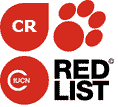Anolis monteverde KÖHLER, 2009
We have no photos, try to find some by Google images search: ![]()
| Higher Taxa | Anolidae, Iguania, Sauria, Squamata (lizards) |
| Subspecies | |
| Common Names | |
| Synonym | Anolis monteverde KÖHLER 2009 Norops altae — SAVAGE & VILLA 1986 (part.) Norops altae — VILLA et al. 1988 (part.) Norops altae — KÖHLER 2000 (part.) Norops altae — LEENDERS 2001 (part.) Norops altae — SAVAGE 2002 (part.) Norops altae — KÖHLER 2003 (part.) Norops monteverde — NICHOLSON et al. 2012 Norops monteverde — NICHOLSON et al. 2018 |
| Distribution | Costa Rica (Puntarenas) Type locality: 2 km east of Santa Elena (10°20’30.5’’N, 84°48’16.0’’W), 1,550 m elevation, Puntarenas Province,Costa Rica |
| Reproduction | oviparous |
| Types | Holotype: SMF 86920, an adult male, collected 17 February 2007 by Gunther Köhler. |
| Diagnosis | Diagnosis: A medium-sized species (SVL in largest specimen 50.2 mm) of the genus Anolis (sensu Poe, 2004) that differs from all Lower Central American anoles except A. altae, A. carpenteri, A. fortunensis, A. fuscoauratus, A. gruuo, A. kemptoni, A. pseudokemptoni in that it is short-legged (longest toe of adpressed hind leg reaches only to tympanum), usually has a single elongated prenasal scale, smooth to slightly keeled ventral scales, and a slender habitus, often delicate. Anolis altae differs from the species in this cluster listed above by the following characteristics: unilobate hemipenis (bilobate in A. altae, A. gruuo and A. pseudokemptoni); basal portion of male dewlap yellow ocher to orange yellow, distal portion reddishorange (more or less uniformly reddish-orange in A. altae, uniform orange in A. carpenteri, posterior portion of male dewlap greenishbeige, anterior portion reddish-orange in A. fortunensis, uniform pinkish-brown to red in A. fuscoauratus, more or less uniform dull orange in A. gruuo, posterior portion rose pink, anterior portion burnt orange, small cream-colored basal blotch in some populations in A. kemptoni, posterior portion vinaceus, anterior portion orange, anterodorsal corner cream color in A. pseudokemptoni); body reddish-brown (greenish in A. carpenteri); ratio tail length : SVL 1.7–1.9, mean 1.8 (1.8–2.2, mean 2.1, in A. altae); ratio HL : HW 1.60–1.75, mean 1.69 (1.68–1.98, mean 1.81, in A. kemptoni, 1.82–1.86, mean 1.85 in A. pseudokemptoni); maximum SVL 47 mm (57 mm in A. kemptoni, 55 mm in A. pseudokemptoni); total number of loreal scales 37–68 (75–88 in A. pseudokemptoni); scales between posterior canthals 7–11 (10–15 in A. fortunensis); dorsal scales in one head length 49–78 (38–46 in A. gruuo, 40–48 in A. pseudokemptoni); scales around midbody 138–160 (118–138 in A. carpenteri). |
| Comment | According to KÖHLER 2009, no characteristics, except geographic location, are known to separate females of A. altae and A. monteverde, but male dewlap coloration and particularly hemipenis morphology readily separates these two otherwise cryptic species. Illustrated in Savage (2002: plate 268) as A. altae. Species group: Norops auratus Species Group (fide Nicholson et al. 2012) |
| Etymology | Named after the Monteverde region where the type series of the species was collected and where it is probably restricted. The name monteverde is used as a noun in apposition. |
| References |
|
| External links |


